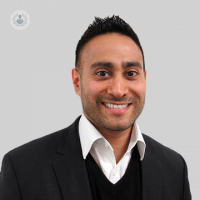How to deal with persistent neck pain
Written by:Neck pain can be caused by several different factors. Depending on the duration and intensity of the pain, this can prove to be debilitating for many patients. Fortunately, there are many different treatment options available. In his latest article, renowned spinal surgeon Mr Amarjit Anand explains some of the causes and treatments for neck pain.

What might be causing my neck pain?
There are several possible causes of neck pain. One of the most common causes is an injury or tear to the intervertebral discs within the cervical spine, which can cause a sharp pain, often accompanied by a spasm.
The disc can also prolapse, which can cause neck pain and nerve symptoms in the arm. This is called radiculopathy. This can cause pain, numbness, paraesthesia (tingling) and weakness in the arm and hand.
The cervical facet joints, which are are little joints of the neck, can also become irritated or arthritic, which causes neck pain and stiffness.
When should I seek medical assistance for my neck pain?
If your neck pain persists for six weeks or longer it is reasonable to seek an expert opinion to determine why the pain is not settling. Neck pain is very common, usually associated with the joints becoming inflammed or a muscular strain. If the pain persists while taking simple painkillers, anti-inflammatories and avoiding aggravating factors then you should consider consulting a specialist.
You should also seek medical assistance if any associated nerve symptoms in the upper limb. This would present with arm pain (radicular pain), tingling, numbness or weakness.
Might my neck pain be a sign of an underlying condition?
Yes. There are simple causes of neck pain, such as muscular strain; but there is often another underlying cause that may require surgical intervention. In young people, it’s usually disc injuries or disc prolapses, and as we age, arthritis or facet joint could be the cause.
In some instances, a large disc prolapse or an enlarged facet joint may impact or compress the spinal cord. This may which cause several symptoms including loss of power in the upper limbs, tingling, numbness, loss of dexterity, and a loss of coordination. If these symptoms were to arise, you should seek medical attention more urgently.

When is surgery recommended for neck pain?
The major indication for surgery in the neck would be if there are symptoms of spinal cord dysfunction from spinal cord compression. This is called cervical myelopathy. There’s no role for conservative management when patients are developing symptoms of progressive spinal cord dysfunction.
Surgery is also sometimes required is if there is nerve pain and weakness in the upper limbfrom a compressed 'pinched' nerves that fails to settle with conservative management or simple interventions such as cervical injections. Surgery can be performed from the front of the neck (anterior approach) or the back of the neck (posterior approach). There are several types of surgery with different approaches to best deal with the specific underlying pathology.
Surgery may be required for nerve pain that's radiating down the arm, or where there is nerve pain associated with weakness of the upper limb.
Simple interventions for neck pain would include cervical injections (both anterior and posterior approach) and radiofrequency denervation (rhizolysis). These are minor procedures performed for axial neck pain, usually as a result of arthritis that becomes chronically inflammed, presenting with persistent pain, despite a prolonged period of conservative management.

What are the most effective home remedies when it comes to managing neck pain?
The first thing to do is avoid any aggravating factors. This would include prolonged screen time. You should limit your screen time, whether that be the computer, iPhone or iPad, to 1-2 hours before a short break is required. You should also ensure that the setup of your desk brings your computer screen up to eye level. Avoid multiple screens, particularly at different heights.
Long-distance driving should also be avoided. You can try adjusting or changing your pillow. Other interventions would include the addition of simple painkillers and anti-inflammatories.
You could also work on strengthening the muscles supporting the cervical spine, primarily the trapezius and the upper back muscles (periscapular muscles). This can take some pressure off the cervical spine. This can be achieved through self-directed exercises, physiotherapy, osteopathic and chiropractic treatments.
Mr Amarjit Anand is a leading spinal surgeon based in Surrey & London, with over 17 years of experience. If you have any neck or spinal pain, you can book a consultation with Mr Anand today via his Top Doctors profile.


